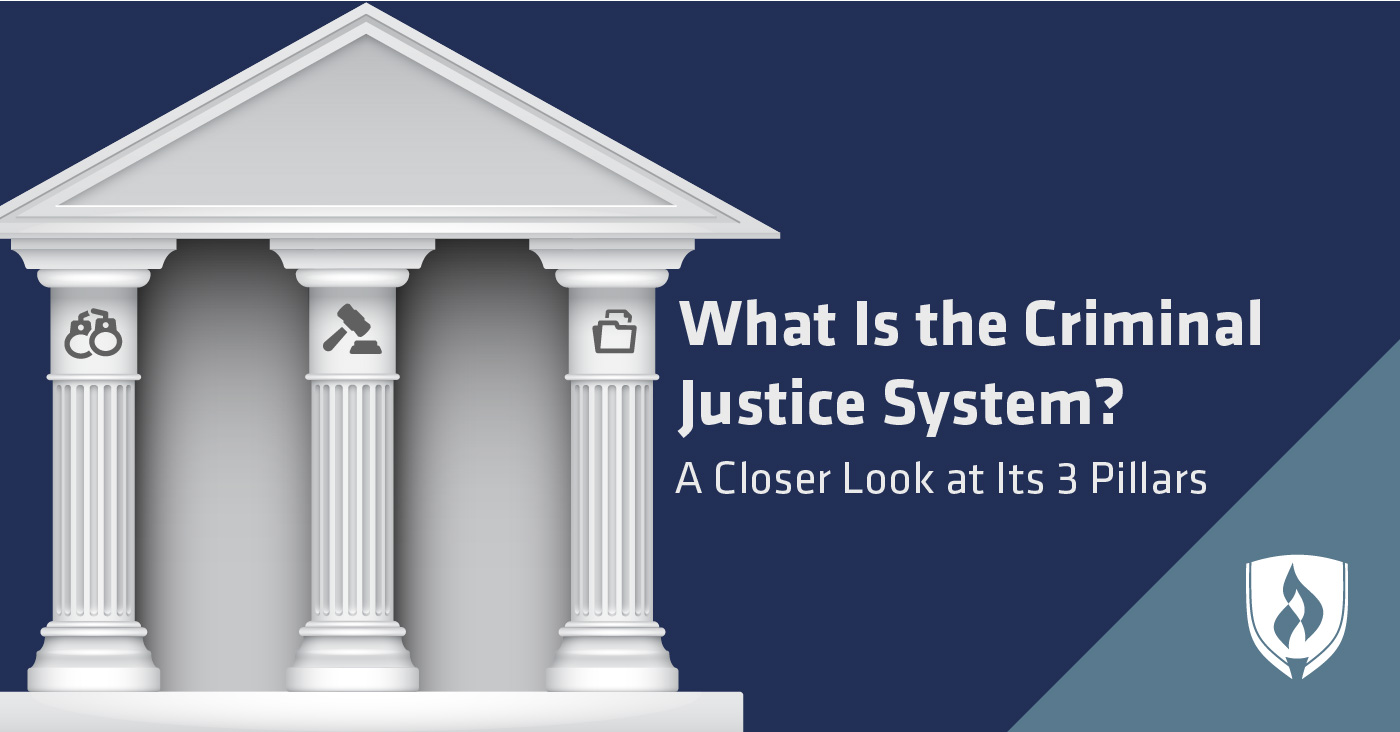What Is the Criminal Justice System? A Closer Look at Its 3 Pillars
05/02/2018

If you’ve kept up with the news lately, it’s enough to make your head spin. Important trials are headed to the Supreme Court, citizens are concerned about the way law enforcement handles high-intensity situations and phrases like “preschool-to-prison pipeline” may have you second guessing everything you thought you knew about the U.S. correctional system.
Every time you stop the radio on NPR or scroll past the latest headline, you’re left with more questions than answers about exactly how our criminal justice system works. It’s becoming clear that your vague memories of high school social studies aren’t going to cut it if you want to stay informed about the current events affecting the U.S. these days.
Understanding the three pillars of the criminal justice system is the first step to easing the confusion. We’re breaking down everything you need to know about the criminal justice system in simple terms to give you the in-depth knowledge you need, without the headache. Read on to find out more about the three pillars of the criminal justice system and how they function.
Law enforcement
Most people are somewhat familiar with the law enforcement pillar of the criminal justice system. Everyone knows that a police officer will be on the scene to help if you call 911 to report a burglary, and you’ve probably seen your neighborhood officer patrolling the streets to keep your community safe.
Though law enforcement officers certainly work hard to protect citizens and give back to their communities, they also play a deeper part in the criminal justice system than you may have realized.
How it works
Law enforcement’s role in the criminal justice system is to maintain peace and safety and to ensure that laws are being obeyed. Laws and regulations vary between each city, county and state, so there are law enforcement officers at every level working hard to prevent and investigate crimes.
Law enforcement officers are called upon during or after a crime to document reports, take witness statements, compile evidence and investigate and apprehend suspects. They also focus on preventing crimes before they occur, often by encouraging community members to report suspicious activity and performing regular surveillance for anything that might be out of place.
At the national level, law enforcement officers take on a specialized area of expertise to support federal agencies such as the FBI or the Federal Air Marshal Service. They use their specific skills and training to prevent the nation from acts of terrorism, drug trafficking, natural disasters and other large-scale events.
Law enforcement careers
A uniformed police officer is probably the first image that pops into your head when you think, “law enforcement.” However, there are many other types of law enforcement officers making up this important pillar of the criminal justice system, including many behind-the-scenes careers you may not be aware of. This is just a sample of the careers involved in law enforcement, according to U.S. Department of Labor (DOL) 1:
- Police officer
- Detective
- Forensics analyst
- Sheriff
- Intelligence analyst
- Fish and game warden
- Fraud investigator
- Secret service agent
- TSA agent
- Customs agent
Court system
If your only experience with the U.S. court system is a couple of days of jury duty and watching Judge Judy reruns, then you may be under the impression that courts exist just to resolve arguments between angry ex-roommates. There’s more to it than that.
The U.S. court system serves justice by providing the opportunity for a fair trial, hearing all the details of a case and determining what happened and what the appropriate punishment should be for the guilty party. They also provide a peaceful, unbiased way for two parties to resolve disputes as well as a place where citizens can appeal laws that may be unconstitutional.
How it works
The court system may seem complicated, but it was carefully designed to ensure that justice is served for all citizens in disputes big and small. There are two types of courts: state and federal. State courts handle most trial cases , including family law matters, traffic violations, wills and estates and most contract and criminal cases.
Federal courts hear cases related to the U.S. Constitution or the constitutionality of a law, bankruptcy, disputes between states and maritime disputes. The federal court system has three types of courts: district courts, which are the first to hear federal cases, appeals courts, which determine if the law was applied correctly during trial court and the Supreme Court, which is the highest court in the nation and has the final say on the constitutionality of all laws.
Court and legal careers
You know the basics about lawyers and judges, but the court system couldn’t function without a pool of other talented employees working hard behind the scenes to ensure that justice is served. Take a look at these job titles to get an idea of the court system careers that are available, according to the DOL 1:
- Lawyer
- Paralegal
- Bailiff
- Judge
- Court reporter
- Court clerk
- Legal secretary
- Arbitrator or mediator
Correctional system
The third pillar of the criminal justice system probably calls to mind movie scenes of a jail’s holding cells or rough prison environments. However, just like the other pillars of criminal justice, there’s more to the correctional system than meets the eye.
The correctional system is a network of agencies that oversees individuals in a wide variety of programs, from incarceration to probation and rehabilitation. This pillar of criminal justice carries out the sentence determined by the court, but there’s another layer of the correctional system that seeks to serve this population with the tools and resources they need to improve their lives going forward.
How it works
The correctional system includes a variety of correctional facilities, such as jails, which are used to hold suspects awaiting trial; juvenile detention centers, which hold offenders under the age of 18 and prisons with various levels of security, which depends on the types of crimes offenders have committed.
In addition to managing and supervising inmates at these facilities, the correctional system is also in charge of ensuring those on parole or probation don’t continue to commit crimes and that they have adequate resources to find necessities, such as housing and employment. These corrections workers may find themselves assisting parolees through regular meetings, arranging substance abuse rehabilitation therapy and facilitating job training programs.
Correctional system careers
Those working in the correctional system play an important part in keeping our communities safer and in changing the lives of those who have broken the law in the past. These job titles are just some of the opportunities you have to get involved in the correctional system of criminal justice, according to the Bureau of Labor Statistics 2:
- Correctional officer
- Prison warden
- Parole or probation officer
- Substance abuse counselor
- Correctional treatment specialist
- Social worker or human service assistant
- Juvenile probation counselor
The criminal justice system: Keeping the community safe
Now that you know the three pillars of the criminal justice system and can catch up on breaking news without your head spinning, you might be intrigued about whether a career in criminal justice is right for you. To figure that out, you’ll want to do some additional research.
Learn more about criminal justice career options in each of the three pillars in our article, “ 9 Careers in Criminal Justice for Degree Holders to Consider. ”
Read more about how supreme court decisions have shaped our criminal justice system, with our article, "3 Supreme Court Decisions That Shaped Our Criminal Justice System".
1Bureau of Labor Statistics, U.S. Department of Labor, Occupational Employment Statistics, [information accessed April 30, 2018] www.bls.gov/oes/.
2Bureau of Labor Statistics, U.S. Department of Labor, Occupational Outlook Handbook, [information accessed April 30, 2018]www.bls.gov/ooh/. BLS salary data represents national, averaged earnings for the occupations listed and includes workers at all levels of education and experience. This data does not represent starting salaries. Employment conditions in your area may vary.
Related Articles:



